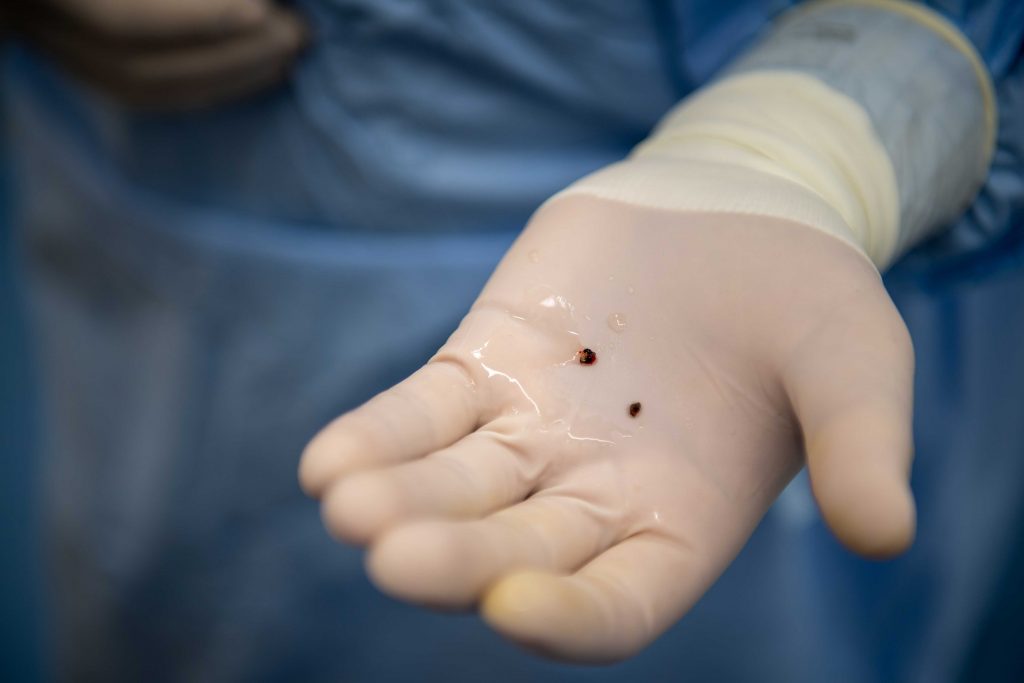If you have been diagnosed with kidney stones, your doctor may recommend that you need to follow a special diet, or at least make some adjustments to your diet.
If you have been diagnosed with kidney stones, your doctor may recommend that you need to follow a special diet, or at least make some adjustments to your diet.
Kidney stone disease diet planning varies with stone type
Kidney stone disease diet planning firstly involves your urologist investigating the type of kidney stones that you have. If you have had your stones surgically removed, your urologist may have sent the stones to the laboratory for analysis. You may also be asked to have some blood and urine tests; these tests will look for the presence of particular minerals and other chemical compounds, that can help your urologist to determine the composition of your stones.

Knowing what type of kidney stones you have will assist your doctor in prescribing a treatment and prevention plan for the future. It will also help them to determine a kidney stone disease diet plan for you, should it be required.
Most kidney stones form as a result of dehydration; when the urine becomes concentrated and there is opportunity for salts and minerals to clump together. There are four main types of kidney stones:
1. Calcium stones
These are the most common type of kidney stones. They form when calcium combines with other compounds (commonly oxalate) in the urine.
2. Uric Acid stones
Uric acid stones are also quite common. They tend to occur in people who lose a lot of fluid due to malabsorption, chronic diarrhea, those with diabetes or a metabolic syndrome, or those who eat a very high protein diet and are prone to gout.
3. Struvite stones
These stones are uncommon and usually form in response to infection in the upper urinary tract.
4. Cystine stones
Cystine stones are caused by a rare genetic disorder known as cystinuria, which causes a natural substance (cystine) to leak into the urine.
Hydration is the most important factor in kidney stone disease diet planning
Making sure that you drink plenty of water is the most important factor in preventing kidney stones and planning your kidney stone disease diet. No matter what type of stones you have or have had in the past, if you drink enough water, stones are much less likely to form.
The general rule of thumb is 2L of water per day, although your urologist may recommend that you drink more or less depending on a number of individual factors. You should drink enough water to ensure that your urine is a pale yellow colour.
Kidney stone disease diet for calcium oxalate stones
Calcium oxalate stones are the most common type of stone. Some people with these types of stones might benefit from reducing the amount of oxalate-rich foods in their diet. Foods high in oxalates include peanuts, spinach, silverbeet, chocolate and sweet potato.
Making sure you’re consuming calcium-rich foods alongside oxalate-rich foods can help too; the calcium will bind to oxalate in the stomach, reducing the chances of kidney stones forming. Do not reduce calcium in your diet. Reducing calcium can actually make these types of stones more likely to form! Sticking to the recommended 2-3 servings of dairy products per day is adequate for most people.
Limiting salt is perhaps the most important dietary factor when considering any kidney stone disease diet. Extra sodium in the diet can cause calcium to leak into the urine, increasing the chances of stone formation.
Kidney stone disease diet for uric acid stones
People with uric acid stones may benefit from following a kidney stone disease diet that is high in fresh fruit and vegetables, with limited animal proteins. Red meats and shellfish have higher levels of a naturally occurring compound called purines. High purine intake leads to a higher level of uric acid production; this means a greater acid load for the kidneys to excrete. Higher acid production makes it more likely for uric acid stones to form.
Limiting beer/alcohol can also help to prevent uric acid stones.
Key points for kidney stone disease diet planning:
Your urologist will be able to make specific recommendations for your individual condition when it comes to kidney stone disease diet planning, as there is no ‘one size fits all’.
Some general key points to keep in mind for optimal kidney health include:
- Remember to drink plenty of fluids, generally at least 2L per day (unless otherwise recommended)
- Limit your intake of high-oxalate foods
- Make sure you consume enough calcium
- Consume a moderate amount of protein
- Avoid high salt foods and don’t add extra salt to your diet
- Avoid taking extra calcium or vitamin C supplements unless your doctor recommends that you do so.
Still curious about kidney stone disease diet planning?
If you have more questions around kidney stone disease diet planning, it is best to speak to your urologist. They will be able to offer the best advice to suit your individual circumstances. Please get in touch with our rooms to schedule your consultation.
